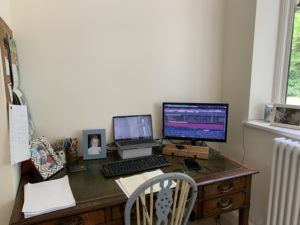How has the Coronavirus affected your day-to-day work – from both a portfolio and workplace perspective?
The major difference from a workplace perspective is that, like many people, I have been working from home for the last few months. As global fund managers, we were already used to communicating digitally with our colleagues, company managements and clients in different regions so the change isn’t so dramatic for us – in some ways, the fact everyone is now communicating like this has actually made it easier for us.
Working from home does bring minor challenges. The social interaction that is part of life at work is hard to replicate though doing as much as possible over video helps. On the other hand, I certainly don’t miss the commute.
The portfolio has held up reasonably well. We generally own high-quality businesses with strong competitive advantages, which have generally been able to adapt to the changing environment.
What has been your biggest contributor to performance since the coronavirus hit markets? What has been your biggest detractor?
Our focus on investing in high-quality companies helped us defend well during the sell-off. There has been a short period more recently when the lowest-quality companies have been in favour – but we knew that would happen (as it has in all sell-offs) and we haven’t tried to chase short-term performance and counter it by buying companies we don’t have long-term belief in.
 Do you have any behavioural mechanisms in place for navigating the market volatility?
Do you have any behavioural mechanisms in place for navigating the market volatility?
We are long-term investors and therefore try to keep that long-term focus rather than getting too worried about how companies will perform over the next few months. Our effort to keep this long-term focus is aided in part by the empirical and theoretical studies we have done to support our philosophy and process. We know there will be shorter periods when our style of investing doesn’t outperform. We have great confidence in what we do over the long-run, however, so we don’t let that distract us.
What has surprised you most about markets during the coronavirus sell-off?
Directionally the moves have made sense – sharply down when the lockdowns started and then almost as sharply up when it was clear they were working to bring the virus under control. That said, the absolute level of markets is surprising given the extraordinary economic numbers that are still being reported and the uncertainty about how long this will last.
What feedback have you had from clients since the sell-off?
Clients are largely in the same position as we are in terms of working from home and the uncertainty around the duration of this situation. Clients generally have been pleased with our ability to adapt and continue to operate effectively. One benefit of working from home is the use of video to communicate with a lot of clients at once is very efficient.
What are the key messages you want to hear from your holdings at the moment?
We want to understand how companies are coping with the current environment but at the same time maintaining their focus on the long-term performance of their businesses. We are also very keen to understand what companies are doing to protect their human capital – whether it be the wellbeing of their employees, supply chain or customers. Relationships with employees, suppliers and customers are critical to businesses and how businesses behave in the current environment will impact those relationships for many years to come.
How does this compare to other market sell-offs you have managed money through?
I have been through a few sell-offs since I started working in investment in the middle of the Asian crisis in the late 1990s. The speed of this sell-off has been extreme, as has the impact on the economy. The other thing that is unusual is it seems likely the trough of economic activity will have occurred within a few weeks of the decline starting. In most sell-offs, the market has spent a considerable period of time wondering when the trough in economic activity will take place and how deep it will be. In the current situation, though, we are thinking about how long the recovery will take and what the long-term changes will be. That is a different sort of uncertainty, which will no doubt have an impact on valuations.
How do you find working remotely during volatile markets?
In volatile markets, it is really important to keep communicating to obtain different perspectives on what is going on. While we work remotely, obviously we need to leverage technology to have these discussions. The advantage of working from home is it is a lot easier to step away from one’s desk, turn off the screens and reset your mind to focus on what is really important in determining the stocks we want to hold to set us up for the next few years.
What do you do for fun when you take a break from working at home?
I’m very lucky in that I live in the countryside. Playing cricket in the garden with my son and daughter has been a great way to take a break from work and spend some time with them that I wouldn’t have been able to enjoy if I had been in the office and they had been at school.
What is your favourite snack when working from home?
I try to avoid too much snacking but the occasional home-baked flapjack is hard to resist.
Do you have a ‘top tip’ to share on working remotely?
Try to remember that, even though your home is now your workplace, it is still your home. Take time away from the screens and enjoy being with your family in the same way you would have done when you were going to the office every day.
Barnaby Wilson is portfolio manager of the Lazard Global Sustainable Equity Select Fund










